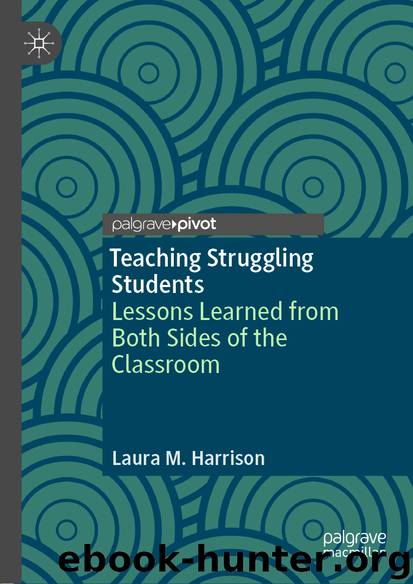Teaching Struggling Students by Laura M. Harrison

Author:Laura M. Harrison
Language: eng
Format: epub
ISBN: 9783030130121
Publisher: Springer International Publishing
Connection and Learning
Before I had experienced life as a struggling student, I underestimated the importance connection plays in one’s ability to get unstuck academically. As a person with a background in counseling, I understood the significant role relationships play in helping people to move through personal challenges. I also appreciated the connection between the emotional and intellectual theoretically, but not as thoroughly as I did once I actually had to access that connection to solve real problems.
This connection manifested in several ways in my relationship with Reshmi. There was the emotional support level, which we both accessed on more than one occasion, particularly the day we received our first tests back. This experience is consistent with a growing body of scholarship documenting the importance of connection in students’ ability to navigate the feelings of disappointment, frustration, and embarrassment that often accompany academic failure (Museus, Yi, & Saelua, 2017; Rayle & Chung, 2007; Strayhorn, 2012). Having a shared experience allowed us both to surface, express, and ultimately manage emotions that, left untended, can diminish the self-efficacy needed to recover and face the next challenge.
“I’m so grateful you’re in this class.” “I would be flunking this class without you.” “I’m glad someone in my life can relate to this experience.” These are sentences Reshmi and I said to one another at least once a week through our semester together. The positive feedings generated by our relationship empowered us to engage in more expansive sensemaking than either of us would likely have achieved on our own. I had been aware of this research, but failed to fully appreciate it until I had experienced the power of collaborative learning myself.
In addition to the emotional support integral to learning, the ability to work with Reshmi helped enormously in mastering the course content. Barkley, Major, and Cross (2014) define this experience as collaborative learning , “two or more students laboring together and sharing the workload equitably as they progress toward intended learning outcomes” (p. 4). I don’t know that I had experienced collaborative learning before this class. I had been in classes where professors required group work, but I don’t recall actually problem-solving with a peer before Reshmi and I began tackling our Linguistic studies together. My performance as a “good student” had been decidedly solo, a reality of which I had not been consciously aware until circumstances dictated the acquisition of new ways of being. This was an epiphany of sorts, realizing that my only options weren’t success or failure entirely on my own.
Download
This site does not store any files on its server. We only index and link to content provided by other sites. Please contact the content providers to delete copyright contents if any and email us, we'll remove relevant links or contents immediately.
| Administration | Assessment |
| Educational Psychology | Experimental Methods |
| History | Language Experience Approach |
| Philosophy & Social Aspects | Reform & Policy |
| Research |
The Art of Coaching Workbook by Elena Aguilar(51199)
Trainspotting by Irvine Welsh(21668)
Twilight of the Idols With the Antichrist and Ecce Homo by Friedrich Nietzsche(18635)
Fangirl by Rainbow Rowell(9252)
Periodization Training for Sports by Tudor Bompa(8273)
Change Your Questions, Change Your Life by Marilee Adams(7783)
This Is How You Lose Her by Junot Diaz(6888)
Asking the Right Questions: A Guide to Critical Thinking by M. Neil Browne & Stuart M. Keeley(5775)
Grit by Angela Duckworth(5615)
Red Sparrow by Jason Matthews(5475)
Paper Towns by Green John(5191)
Room 212 by Kate Stewart(5123)
Ken Follett - World without end by Ken Follett(4734)
Housekeeping by Marilynne Robinson(4449)
The Sports Rules Book by Human Kinetics(4388)
Papillon (English) by Henri Charrière(4274)
Double Down (Diary of a Wimpy Kid Book 11) by Jeff Kinney(4273)
The Motorcycle Diaries by Ernesto Che Guevara(4102)
Exercise Technique Manual for Resistance Training by National Strength & Conditioning Association(4071)
